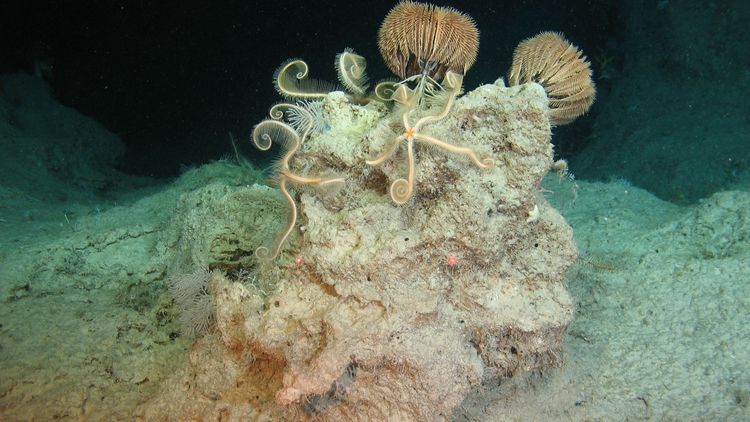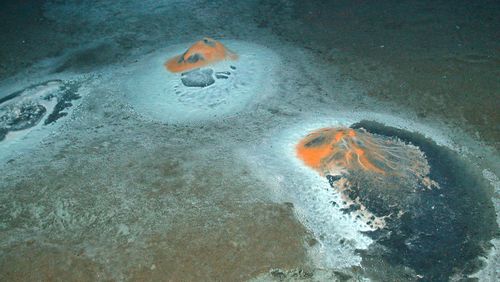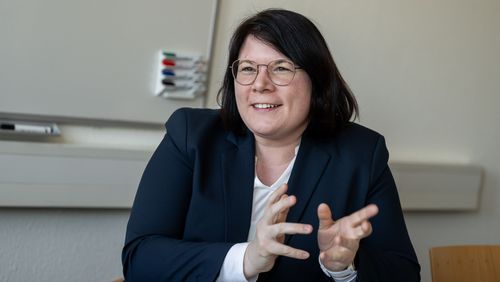Biodiversity and marine research is one of the university's main areas of expertise. Researchers combine microbiological, ecological, geochemical, physical and modelling approaches. They also study the adaptation of organisms to the environmental conditions of their habitats at different biological, temporal and spatial scales - from the molecular level to the global distribution patterns of many species and the functional role of biodiversity in the ecosystem. Since 2019, researchers from the University of Oldenburg have also been involved as partners in the Cluster of Excellence Ocean Floor (The Ocean Floor - unexplored interface of the Earth) at the University of Bremen. In the follow-up proposal, the Universities of Oldenburg and Bremen are acting jointly as applicant universities. The project focuses on the ocean floor - the largest habitat on Earth, but also one of the least explored.
"One feels like a true explorer"
The oceans are home to much of the planet's biodiversity. They have a major influence on our climate and provide food for billions of people.
Since 2009, the United Nations has celebrated World Oceans Day on 8 June to draw attention to the oceans, which cover almost three-quarters of our planet. At the Universities of Oldenburg and Bremen, researchers from various disciplines are studying the ocean and how it is affected by global warming, for example. To mark World Oceans Day, researchers from both universities tell us what they are studying and why their research is important.

Robust estimates of possible future scenarios are important not only as a basis for political decision-making. We therefore want to better understand how biological processes in the ocean feed back into the climate system in order to better assess future developments.
We use mathematical models to study how the ocean naturally stores CO2 and removes it from the atmosphere in the long term. However, microbial processes have not been sufficiently considered in these models. Microalgae fix about as much carbon every year as all land plants combined, and bacteria in the ocean convert much of it back into CO2. By better representing these processes in models, we are helping to make modelling scenarios more realistic.
I am fascinated by how tiny microorganisms can have such a huge global impact, for example by storing carbon in the ocean. I also like the challenge of keeping track of a complex system without losing sight of the details.”
I hope to contribute to a better understanding of the complex relationships between ecosystems and the environment.

If we understand how important microorganisms in the deep sea are for global element cycles and ultimately the climate, we will also strive to protect and preserve these habitats.
Microorganisms are survival artists and have managed to adapt to the most adverse environmental conditions over millions of years. In my research, I contribute to deciphering these mechanisms of adaptation.
In deep-sea research and especially in my specialty field of lipid and metabolite research, one feels like a true explorer. We know that each sample is unique and offers insights into a completely foreign world that awaits to be discovered!”
Microbes flourish in every earth ecosystem. We can learn much from the determinants of their perseverance and resilience.

Microbial biotechnology is already contributing to sustainable agriculture practices, generation of biofuels, improving medicine, and more. Potential solutions to global environmental challenges will certainly come from microbes, and this will only be possible if we learn more about their evolution and lifestyles.
By taking advantage of computation and immense data streams my research group sheds light on microbial ecology and evolution in marine systems and beyond. For example, we are developing methods that help us understand the mechanisms by which microbes cope with and adapt to their ever-changing habitats.
Molecular biology, computation, and technology, have rapidly advanced our knowledge about the silent majority of our world. And we are only at the beginning of our journey. Given the tremendous amount of data emerging from microbial systems, I consider myself as someone who is at the right place to contribute to our emerging understanding of microbes as a computer scientist and a microbial ecologist.”
I am in love with the huge biodiversity that evolution created for millions and millions of years and my goal is to help to preserve it.

I redirected my career as a marine biologist to biogeosciences aiming for a wider impact by tackling more directly our worst enemy: climate change.
My research aims to unravel the warmer climates in the past and teach us lessons of how this past could repeat itself in the future in response to human production of greenhouse gases.
Sharing our knowledge with young people is especially inspiring, since it is in the hands of this and next generation to tackle the problem of climate change. Being able to see passion and interest awaken in their eyes during a lecture or a public talk fills my heart with hope and excitement.”
We need to understand what makes marine ecosystems resilient - also to assess how best to protect the oceans.

Our oceans will become warmer and more acidic, and extreme events such as heat waves will become more frequent. Whether an ecosystem remains healthy and functional depends on the ability of living organisms and their communities to survive environmental change.
We investigate why some ecosystems are more sensitive to environmental change than others, for example through experiments or by statistically combining the results of other studies to find overall patterns. Together with researchers at the University of Bremen, we are also analysing data from Earth's history to see what we can learn from past environmental changes. It turns out that communities tend to be more stable when they consist of a variety of species that respond differently to environmental change.
Originally, I wanted to study what leads to the incredible biodiversity we have in many ecosystems. But in the face of rapid global change, it became increasingly important to explore the consequences of losing this diversity.”

As an organic geochemist, I’m keenly interested how carbon in its various forms moves through marine biota, the ocean, and the ocean floor – today and in the past – and how these processes interact with climate.
The research of my group contributes to a mechanistic understanding of the role of microorganisms in the carbon cycle. Such knowledge is vital for predicting biological feedbacks in response to future environmental change.”
Topics
- Astronomy
- Biology
- Botanical garden
- Chemistry
- Computing Science
- Cooperations
- Covid
- Culture
- Dutch Studies
- Early Career
- Economics
- Educational Sciences
- Energy
- Energy Research
- Environmental Sciences
- Equal opportunities
- German Studies
- Graduate academy
- Health Services Research
- Higher Education Policy
- History
- Human Medicine
- International affairs
- Marine Sciences
- Material Culture
- Medical ethics
- Medical Physics and Acoustics
- Music
- Neuroscience
- People
- Philosophy
- Physics
- Presidential Board
- Psychology
- Research
- Slavic Studies
- Social Sciences
- Special Needs Education
- Sport Science
- Study Affairs
- Sustainability
- Teacher Education
- Theology
- Transfer
- University Medicine
- Ukraine
- Wind Physics




